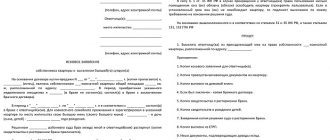Content
1. How to discharge from a home according to the general rules
2. What to do if it is not possible to submit documents in person?
3. Option one – drawing up a power of attorney
4. Option two - using the capabilities of the State Services portal
5. Features of checking out of an apartment in some situations
Registration of a place of residence is not just a stamp in a passport, but an opportunity to fully exercise one’s rights in the country. In case of a change of place of residence, for example, moving to another locality, it is mandatory to go through the procedure of deregistration in the old city and register in the new one.
According to the law, both procedures are carried out in the personal presence of the citizen. But what to do if there is no opportunity to visit the state. institutions for discharge? How can I be discharged without submitting an application in person? You will find out in this article.
Is it possible to discharge a person without his presence?
Registration and deregistration of citizens of the Russian Federation at their place of residence are regulated by Federal Law No. 5242-1 of June 25, 1993. According to the latest changes and additions to this law, a person can initiate the procedure in several ways:
- by personally submitting documents to the migration authority;
- remotely - by sending an electronic application form from your personal account on the State Services website.
But one way or another, all those leaving must at least once visit the territorial department of the Department of Internal Affairs of the Ministry of Internal Affairs of the Russian Federation, in the first case, to pick up a passport, in the second, to confirm their identity and put a stamp in the passport.
Without personal presence, a citizen will be discharged only in two situations:
- If he cannot visit the migration authority and voluntarily transferred his powers to a third party, by issuing a notarized power of attorney.
- If the discharge is forced on the basis of a relevant court order.
How to be discharged from a home according to the general rules
There will be no difficulties if you take care of the discharge procedure yourself before or after your change of residence. Both options have their own characteristics. If you are discharged before changing your residence, then you need to write an application to the Federal Migration Service along with the necessary documents. Upon arrival at your new place of residence, you receive an address sheet and present this document for subsequent registration.
Important: This option is not convenient because it requires going through the procedure twice. In addition, until you register at a new place of residence, you are legally considered homeless.
The second option is more expedient and suitable for those who know where they will register in the future. Upon arrival at your new residential address, you come to the local UVM to register. In the process of applying for a new registration, the old registration is canceled. You do not need to go through the registration procedure twice.
What to do if it is not possible to submit documents in person?
There are two ways to extract without personal presence: by proxy through a personal representative or using the multifunctional State Services portal. However, before considering options for discharge without visiting the UVM, let’s establish the reasons for deregistration without personal presence:
- Automatic cancellation of registration. We have already said that when you arrive at a new place of residence, the registration ceases to be valid for the old one.
- Using the website for the provision of public services. You can submit your application remotely.
- Serious illness, stay in another locality (for example, a business trip), departure to another country - in these circumstances, a power of attorney is issued.
In addition to these situations, serving a sentence in a prison camp or performing military service are considered indirect reasons. In all of the above situations, visiting the UVM is impossible. Let's look at how to check out of your home without visiting a government institution.
Option one - drawing up a power of attorney
Legal relations related to deregistration at the place of residence are documented in writing by the citizen representing the interests. This could be anyone - an acquaintance, a friend, a brother, a company employee or a lawyer. A power of attorney allows you to transfer the authority to issue an extract to an authorized person. Where to go to draw up a power of attorney and how to write it out?
Instructions for issuing a power of attorney
Before you start drawing up a power of attorney, you should make sure that the UVM accepts applications for an extract under a trust document. There are situations when an employee refuses to discharge you without a personal visit. This is due to the high level of illegal manipulations with registration. Therefore, check whether it is possible to carry out an extract using a power of attorney or whether you will have to look for other methods. As a rule, there are no problems with this, so you can start the discharge procedure through a representative.
1. Step one - visit a notary
Contact the notary office at your place of residence and report your desire to issue a power of attorney. It is advisable for the citizen representing your interests in the future to be present. This way the notary will be confident that the transaction is legal and completed by voluntary consent.
During the process of filling out the documentation, the notary will tell you how to complete it correctly. The power of attorney must contain the following information:
- Full name, passport details of yours and your representative.
- Name of the trust document (a simple document is issued for the extract).
- Duration of validity of the trust document.
- The wording of authority is deregistration or registration.
- Date of document execution.
- Notarization.
Please note that an application for deregistration (form No. 6) is drawn up along with the power of attorney. The application contains the name of the UVM department, contact details of the citizen who is being discharged, as well as the addresses of discharge and future registration. If you do not yet know about the future registration address, you are allowed to leave the entry “New address unknown.” Next, the notary's stamp is affixed.
After issuing a power of attorney, you must hand over all the necessary documents to the representative - in person or by postal order. If you use postal services, send documents by certified mail.
List of documentation for discharge through a representative:
- Principal's passport.
- Application and power of attorney certified by a notary.
- Departure address sheet.
- Photocopy of the representative's passport.
- Statistical sheet of departure (when the principal moves to another country).
As already mentioned, Migration Service employees may refuse the procedure for deregistration. In such a situation, you can send a complaint to your superiors or file a lawsuit.
2. Step two – issuing an extract with a trust document
After receiving the documentation, the representative contacts the Department of Internal Affairs, the MFC or the housing department of the management company. Receiving documents does not take much time. Inspectors check the documentation and set a completion date. Then, the representative picks up the passport at the appointed time and sends it to the principal. This completes the discharge procedure without personal presence.
Option two - using the capabilities of the State Services portal
You can sign out without involving a third party. You can submit an application for an extract using the State Services website. This option is suitable for those who, for various reasons, cannot personally submit an application to the UVM. However, you will have to visit the migration service while submitting the original documentation. But here you can get by with issuing a power of attorney for the extract.
Submitting an application remotely is only possible for users registered in the system. If you do not have a Personal Account on the State Services portal, register. This will take a couple of minutes. If you encounter difficulties in registration, you can use the help of employees at the MFC. To open a Personal Account, you need a passport, SNILS and TIN. The system will give hints on how to create a login and password to enter the resource.
Remember that deregistration from the old living space and registration at the new residential address are two different services. Therefore, before registering at a new place of residence, you must first cancel your registration at your current one.
Procedure for deregistration on the State Services website
- Go to the State Services portal via the link gosuslugi.ru. Click on “Personal Account” (in the upper right corner). To enter the site, a login and password are required. If you do not remember your login information, you can easily recover it by clicking on the “Recover Password” link.
- Scroll the portal page to the “Popular Services” section. Click on the item “Registration at place of residence or stay”. Next, select “Removing a citizen from registration at the place of residence.” The page that appears provides information about the service provided - terms of provision, cost of the service, methods of obtaining, etc.
- Click “Get service”. After this, a page with the application form will appear. Some fields will be entered automatically. In the “Applicant Type” section, select the appropriate item.
- Next, fill in the fields with personal information (full name, year of birth, gender, telephone number and email address). Carefully fill out the series/passport number. When visiting the UVM, since the information provided will be verified with the original. In addition, you must indicate the full address of your current registration and information about the future place of new registration. If you do not yet know the new address, you do not need to indicate it. This is required for formality and theoretically can be written by anyone on the territory of the Russian Federation.
- Then the reasons for discharge from the current place of residence are indicated. The system already offers template options, but you can highlight your own. The most common reasons are: Serving a sentence in a prison camp. Recognition of a person as missing. Death or recognition by the court as dead. Forced eviction from a home or loss of ownership rights to it. False information provided for registration. Citizenship of another country.
- The last action on the site is to mark the UVM department for submitting documentation. The portal independently offers options. You just need to click on the geographical location that is convenient for you. Agree to the processing of data and click on the “Submit” button.
The application is reviewed within three days. But don't worry if your application takes longer to process. This is due to the workload at the UVM department or the expectation of feedback from other departments. As soon as the application is reviewed and the application is accepted, you will receive a message on your phone and an email notification.
The notification indicates the time and department of the Department of Internal Affairs for the provision of documentation, namely:
- Extract from the house register.
- Discharger's passport.
- A certificate confirming the property right to housing.
- A trust document for the representative, including his passport.
Employees check the information from the web resource with the authenticity of the information in the documents. If there are no problems, the stamp will be affixed. It should be noted that the procedure is free. In addition, after discharge, you have a week to register at your new address. In the event that you are temporarily in another locality, the period of registration is increased to 90 days. Failure to comply with migration legislation will result in a fine of up to 3,000 rubles.
How to sign a person out of an apartment without his presence
The tenant has the right not to be present at his own discharge at the passport office if:
- he has a confidant;
- he decided to register at a new place of residence with simultaneous automatic deregistration from the old one;
- it operates remotely through the State Services website (to get a stamp you need to visit the migration authority).
Keep in mind that due to the recent increase in cases of fraud, your personal representative, even having an official notarized power of attorney in hand, may be refused by the registrar. Therefore, before asking someone to represent your interests at the migration authority, call them and ask if they accept representatives by proxy.
Procedure
Depending on the choice of method, the actions will vary.
To deregister using a power of attorney, you must:
- Download the application form from our website and print it or pick it up at the passport office.
- Visit a notary, draw up and certify the power of attorney and the pre-filled form.
- Give the necessary documents to your representative and ask him to visit the migration authority on your behalf.
- Receive your passport with a deregistration stamp from the hands of a trusted person.
If you left the city for a short time and are sure that you will have time to arrive at the Migration Office of the Ministry of Internal Affairs of the Russian Federation at the time appointed by the registrar (usually three days after submitting an online application) to affix a stamp, then you can use the service on the State Services portal to initiate an extract. To do this you need:
- Register on the portal and log into your personal account.
- From the list of popular ones.
- Please read the terms and conditions carefully.
- Fill out and submit the electronic form.
- On the day appointed by the registrar (the information will be sent to you by email), visit the migration office and present to the employee the original documents specified in the application.
- On the same day you will receive a passport with a deregistration stamp.
You can read more about the remote discharge procedure through the Public Services portal here.
Procedure
Despite the fact that checkout from an apartment is carried out quickly and does not require the presentation of a large package of documents, the procedure must be approached responsibly:
- do not neglect going to the notary, if a trusted person will act on your behalf, do not forget to notarize the application in addition to the power of attorney - this is important;
- be sure to check if your passport has expired;
- When leaving a municipal apartment, pre-pay off your utility bills, if any.
Statement
When filling out the form, you must provide personal information about the tenant being discharged, as well as the addresses of his old and new place of residence. If at the time of submitting documents for deregistration you do not yet know where you will move, indicate any address, for example, a close friend or relative. This information will not be taken into account anywhere in the future.
Documentation
When voluntarily checking out of an apartment, only two documents are required:
- passport;
- statement.
The representative must additionally present a notarized power of attorney.
Deadlines
The registrar is given three working days to process the application, after which you will be officially deregistered at your place of residence. When submitting an application through the State Budgetary Institution “My Documents”, the deadlines can be extended to 6 days.
If you plan to forcibly evict a negligent tenant, be prepared for the fact that the procedure may be delayed. Since the consideration of the claim in the court of first instance will take at least two months.
Price
Checking out of an apartment, regardless of the chosen application method, is free of charge. If a trusted person is involved in registering you on your behalf, you will have to pay for the services of a notary.
If the deregistration is carried out forcibly at the initiative of the homeowner, then when filing an application with the court, you will need to pay a state fee, the amount of which in 2021 is:
- for citizens – 300 rubles;
- for legal entities – 6000 rubles.
In some cases, in case of forced discharge through the court, the assistance of a professional lawyer may be required, which will also have to be paid according to the price list of the law office. However, later the cost of his work can be attributed to legal costs and recovered from the defendant.
Example . Druzhkova A.S. lived in a municipal apartment with her husband V.P. Druzhkov. The responsible tenant was the husband, and the wife received the right of residence only after marriage. After several years of married life, the couple decided to separate and divorced. Druzhkov repeatedly asked his ex-wife to leave the apartment, since she had to pay utility bills. However, Druzhkova did not want to do this, since they had a bad relationship with her ex-husband. Then Druzhkov went to court and demanded that his ex-wife be recognized as having lost the right to use the apartment. The claims were satisfied, the husband applied to the Department of Internal Affairs of the Ministry of Internal Affairs of the Russian Federation with a court decision, and Druzhkova was discharged from the apartment.
Features of check-out from an apartment in some situations
Some reasons for discharge without personal submission of an application require special attention.
- Serving a sentence in MLS. It is possible to discharge a convicted person from his home only with the consent of the person serving the sentence based on the application and decision of the judge. If there is no agreement, but you need to write it out, go to court.
- Completion of military service. Since 2012, legislation has obligated military personnel to be discharged at their place of residence during military service. It is clear that a conscript soldier will not be able to visit the Military Commissariat or the MFC, so this issue is dealt with by the owner of the property on the basis of documents from the military commissar.
- Death of a citizen or recognition as missing. In this case, the owner of the home is responsible for the discharge of the deceased on the basis of a death certificate and a court decision.
Thus, it is quite possible to check out of the apartment without personal presence. The main thing is to evaluate the advantages and choose the right way to submit an application - remotely or by proxy. The deregistration procedure in both cases is free. However, if you use third parties, such as companies or lawyers, to represent you, you will have to pay for their time. In addition, drawing up a power of attorney will also cost money to pay for notary services.
Deregistration without personal presence has a lot of features. The success of the process depends on following the instructions correctly. If you act in a hurry, you can make many mistakes in the application, draw up an incorrect power of attorney, or submit an application to the wrong government agency. Minor shortcomings increase the time of discharge and take a lot of effort and time.
How to check out of an apartment - detailed instructions
To discharge a tenant, you should go to the local FMS office. Since the beginning of 2014, this body has been the only one dealing with registration matters. The address of the department does not play a special role, but for convenience it is worth going to the department located closest to the apartment from which the eviction will be carried out.
The entire discharge procedure takes place at the passport office; no other authorities need to be visited. An exception is a court decision. If there is such a decision, then you will have to repeatedly visit both the court and the FMS authority.
The step-by-step procedure for evicting a tenant is as follows:
- Decide on what basis the tenant should be evicted. If based on a power of attorney, ask to write it.
If based on a lawsuit, wait for the conclusion of the court. - Having received the necessary document (power of attorney or court order), collect the remaining papers. An exhaustive list of them will be presented below.
Until all the documents are collected, there is no point in going to the FMS office, because the employees will ask you to bring the necessary papers and come back again, and this is a waste of time. - Write an application on the form that is issued right there, at the FMS office.
There are also samples of filling - both in the main hall and in the offices. When filling out the application, you need to pay attention to handwriting and literacy. Errors are unacceptable, as are crossing outs and corrections. In addition to legibility, the truthfulness of the information provided in the application is important. - Submit the application along with the documents to the FMS officer. You should ask one of the employees about which office to contact.
In some departments you can be received in any office, while in others the discharge with and without presence is divided into separate rooms. - Wait until the FMS employee checks the documents and application. There is always a risk that he will not understand some part of the application, and the document will have to be rewritten.
He may also find inconsistencies in the documents or consider the grounds for the evicted person’s absence to be insufficiently weighty. This doesn't happen often, but the chance still exists. - If the employee has checked and accepted the documents, ask him when you can apply for the results. Perhaps everything will be decided in the next 1-2 hours, and you should just wait a little.
If the FMS has a lot of work to do, the process may take 2-3 working days.
Important! After accepting the documents, the chance that you will be refused is minimal. The case can be considered successfully completed. They refuse only in exceptional cases (for example, if the evicted person suddenly changes his mind).
List of documents required for deregistration
The required documents differ for different situations. When extracting by power of attorney, this is one list, when extracting by court order - another.
List of documents required for eviction by power of attorney:
- a power of attorney written by the person being evicted and notarized;
- passports of the principal and the applicant (the one who applies to the FMS);
- an application filled out on a form issued directly to the FMS (there are also samples there);
- copies of documents for housing (necessary if the applicant is its owner);
- written consent of the owner or each of the owners, if there is more than one.
List of documents required for eviction by court order:
- a copy of the claim filed with the judicial authority;
- a decision of a judicial authority on the forced eviction of the defendant;
- plaintiff's passport;
- copies of documents for housing (necessary if the applicant is its owner).
Important! Documents should always be submitted to the FMS office. There is no need to take them to court - he has already made a decision and is no longer involved in the case.
Registration deadlines
The total period allotted for any registration matters is 3 working days. This time is required to verify the documents provided by the applicant. The deadline is identical for any case, in particular for eviction without personal participation.
Longer than 3 days happens in exceptional situations (either the applicant came just before the holidays, or he is asked to bring an additional document). In general, the result - approval or refusal - appears within 3 days. If the FMS body is not very busy, then the case can be completed on the same day.
If we are talking about discharge through the court, then there are no clear deadlines. The claim can be considered as long as necessary. But from the moment the applicant submits the court decision to the FMS department, everything will happen within the same 3 days.
Do I need to pay and how much?
No. The procedure is completely free. But for discharge through the court, again, there are nuances. When filing a general civil claim, you will need to pay a state fee. In most regions of the Russian Federation it is 1000 rubles. This is typical only for the court, but in the FMS everything happens free of charge.
What documents does the FMS issue after completion of the procedure?
The only document that FMS employees give after completing the procedure is the passport of the discharged person. The passport contains a stamp indicating deregistration. In the case of a court order, everything happens exactly the same, but the stamp itself is different. The FMS does not issue additional papers or certificates.
Features and nuances of various situations
Let's consider several important nuances characteristic of discharge in the absence of the discharged person:
- The owner of the property and his relatives, even if they have not lived at the place of registration for a long time, cannot be evicted in this way. To start this process, you must obtain special permission, most often through a judicial authority.
- It is possible to evict an owner without being present only with the help of the courts, and not always. His rights to the apartment are higher than most offenses. Therefore, to deregister the owner, his presence and consent are necessary, and this can only happen during the purchase and sale of an apartment or in certain legal cases (the question of in what situations the owner can be evicted from an apartment without his consent is discussed here).
- Minor residents cannot be discharged without a parent present. To evict a child, the personal participation of the father or mother is required. Therefore, it often happens that a family has been living abroad for a long time and is not able to come to Russia, while the parents have been evicted from the apartment, and the child is still listed as its tenant.
- If a person has temporary registration, then most likely the owner of the property has a rental agreement with him. Most lease agreements provide that a tenant can be removed from temporary residence even without his knowledge. This greatly simplifies the procedure.
Another important nuance is an extract from the old place of residence when registering at a new one. Now the FMS works in such a way that a person does not need to check out of his previous apartment in advance. He goes to the department at his new place of residence, registers there, and FMS employees themselves transmit the information to the “old” place, and discharge occurs automatically, without a person coming.
We considered possible options for discharging a person from a person’s apartment without his presence. But more often there are situations when a person is present, but does not give his consent to discharge. We discuss what to do in such situations in our next articles:
- Is it possible and how to discharge a person without his consent if I am the owner of the apartment?
- How do you check out of a municipal apartment?
- How can you sign a registered person out of a privatized apartment?
- How to expel your ex-wife from the apartment without her consent and what to do if you have a child?
- How to expel your ex-husband from an apartment if he is not the owner?










